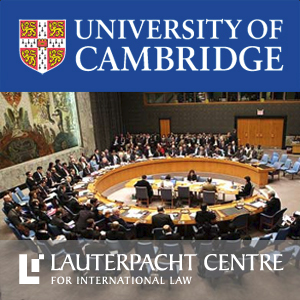'The End of the Global Rule of Law?' by Professor Andrew Hurrell
Duration: 43 mins 53 secs
Share this media item:
Embed this media item:
Embed this media item:
About this item

| Description: |
The Lauterpacht Centre for International Law (LCIL), University of Cambridge hosted a special evening lecture by Andrew Hurrell, Montague Burton Professor of International Relations at Oxford University and a Fellow of Balliol College. The lecture, entitlted 'The End of the Global Rule of Law?', was delivered at the Lauterpacht Centre on Monday 27th February 2017.
For more information about events at the Centre, please see the LCIL website at http://www.lcil.cam.ac.uk |
|---|
| Created: | 2017-03-03 11:03 |
|---|---|
| Collection: | LCIL International Law Seminar Series |
| Publisher: | University of Cambridge |
| Copyright: | University of Cambridge |
| Language: | eng (English) |
| Keywords: | International Law; International Relations; Rule of Law; Global Order; |
| Abstract: | Global order is moving towards great instability and possibly towards greater conflict, with the return of geopolitics and heightened nationalism in almost all of the major states in the system, with the structural instabilities and inequalities of global capitalism, and with new and disruptive patterns of social and political mobilization. Existing international institutions are under immense stress with the frequent invocation of terms such as gridlock, stagnation, or fragmentation. This is true of the most development and hitherto successful institutions (such as the EU); it is true of some of the most fundamental sets of legal rules (such as those relating to the use of force); and it is true even of those areas where the alleged ‘imperatives’ of global cooperation have seemed most evident (as with climate change). Increased politicization is certainly visible at the domestic level, with populist mobilization in the US and Europe against globalization and global governance, new forms of domestic political cleavages, and far greater space and success for xenophobic and nationalist parties, groups and regimes. It is also visible at the international level, with direct geopolitical rivalries (South China Sea, Ukraine, NE Asia), increased contestation at the regional level, and the spill over of such geopolitical rivalries into other areas such as cyber space or international economic relations such as trade and foreign investment. And, of course, the future direction of US foreign policy remains dangerously unpredictable.
This lecture will address three questions: First, what are the drivers of the present crisis? Although nationalism and identity politics stress what is particular and distinctive, the fact that these changes are occurring is many different places across the world strongly suggest that systemic factors and forces are at play. So we need to think about how best, analytically, to make sense of these systemic drivers. And we need to place them in a broader and longer-term historical perspective. Does it make sense to think in terms of analogies with the 1930s or the 1970s? Second, how has the idea of the global rule been understood in the post-Cold War world? Before concluding that the only choice is between a particular view of the so-called global liberal order and renewed conflict and chaos, we need to ask about the different roles that international law has played, or might play, within a far more strongly global international society. And third, what can we learn from looking in more detail at four areas: the nuclear order, the laws of war, intervention, and complex economic governance? What can we learn about the capacity of different areas of law and governance to withstand turbulent times? What is the relationship between power-political (dis)order and the different roles of international law and international institutions? |
|---|---|

